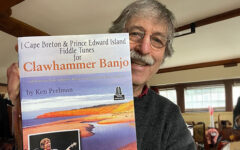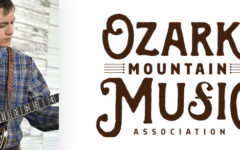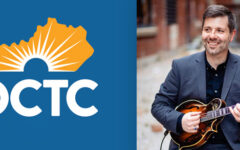 I just received a very welcome bit of news from my friend, Dave Hollender, a professor at the prestigious Berklee College of Music in Boston, announcing their newly established program to accept bluegrass musicians to study and receive a degree from Berklee, using standard bluegrass instruments as their principal focus. The effort to accomplish this change has involved many years of planning and study, and seeing bluegrass instruments recognized in this way by an institution of this caliber is a milestone of no small measure.
I just received a very welcome bit of news from my friend, Dave Hollender, a professor at the prestigious Berklee College of Music in Boston, announcing their newly established program to accept bluegrass musicians to study and receive a degree from Berklee, using standard bluegrass instruments as their principal focus. The effort to accomplish this change has involved many years of planning and study, and seeing bluegrass instruments recognized in this way by an institution of this caliber is a milestone of no small measure.
Here are the details:
Berklee College of Music, the world’s largest independent music college and the premier institution for the study of contemporary music, who”s alumni reads like a “who”s who” in contemporary music, has announced a new Acoustic String Principal, opening the door to banjo and mandolin players who wish to attend the college in Boston.
At Berklee, even students in the Music Business, Music Technology or Film Scoring programs must declare a Principal instrument, and take at least two years of private instruction on their instrument, along with theory, harmony and ensemble classes, in addition to the course requirements for their major. This is one aspect of the Berklee experience that has set it apart from many other fine music schools, and made a Berklee degree such a high rated credential in the industry for many years.
With this new Acoustic String Principal, banjo and mandolin, which have often been overlooked or dismissed by conservatories and college music programs, will now take their rightful place at Berklee. Students accepted to study banjo or mandolin at Berklee will take lessons in the String Department, chaired by Matt Glaser, with banjo/double bass Professor Dave Hollender and mandolin/guitar Associate Professor John McGann, and will spend four years studying with 3,800 students and 460 faculty members from over 70 countries.
While this addition represents the beginning of what promises to be a major expansion at the college, bluegrass isn”t completely new to Berklee. Graduates with connections to bluegrass include Gillian Welch and David Rawlings, Casey Driessen, Rushad Eggleston (the first Berklee student to win a Grammy while still a student), Chris Pandolfi, and Evan Price. Three-time Galax Bluegrass Fiddle champ Nate Leath is presently a student.
The addition of bluegrass bands to the college”s ensemble program four years ago was initiated by Hollender, who responded to a call to add more styles and to expand roots music offerings in the Ensemble Department. Last year McGann added Celtic and early country music ensembles. With the success of these bands Glaser, Hollender and McGann launched an initiative to start the Acoustic String Principal in order to offer banjo and mandolin players the chance to study at the college. Recognizing the importance and value of bluegrass and acoustic string music, President Roger H. Brown, the deans and chairs supported the initiative and approved creation of the program.
This past March Brown went to Nashville for a ceremony in which he conferred an honorary doctorate upon Earl Scruggs and announced the creation of the Earl Scruggs Endowed Residency, which will provide funds to bring country and bluegrass artists to Berklee for clinics and residencies.
Berklee is not the first college to teach bluegrass music, but its approach and objectives will be somewhat different. Unquestionably, developing strong roots and appreciation for the tradition will always be an indispensable part of any musician”s education, and playing straight ahead bluegrass will be part of the curriculum. However, Berklee”s program would not be a good fit for the player who wants to play nothing but traditional banjo styles in a traditional bluegrass band.
Berklee”s curriculum in ear training, harmony/theory, improvisation, music technology and reading have become the model for much of jazz and pop music education. The size of the student population makes it possible to offer the greatest number and variety of elective courses of any music program. As students deepen their musical awareness and augment traditional skills and vocabulary with new techniques and concepts they will have the chance to apply these skills in an unparalleled range of performing ensembles.
The goal is that at the end of the day these students won”t tend to be narrowly defined as banjo players or mandolinists, but simply as musicians.
“You”ve got to keep one foot in the past and one foot in the future.” Jazz trumpeter Dizzy Gillespie
Find out how to apply at the Admissions web page.
You can email questions about banjo and mandolin at Berklee to David Hollender, John McGann or Matt GlaserA personal aside: My son (John Lawless, III) is currently a student at Berklee, starting his senior year in the Jazz Composition department. Our experience with the school and the quality of the music education which is available there suggests that one would be hard pressed to find a more rigorous or effective program, nor one that more accurately reflects the “real world” of the music business in which graduates will be expected to find work. I add my strong personal recommendation, and suggest that any young bluegrass musician who is currently investigating music colleges (or parents of same), take a close look at this new program at Berklee .
UPDATE: Thanks to Steve Schaaf of Coal Mountain for catching that we had neglected to mention dobro wizard Andy Hall in our listing above of notable Berklee graduates with a strong connection to the bluegrass world.







